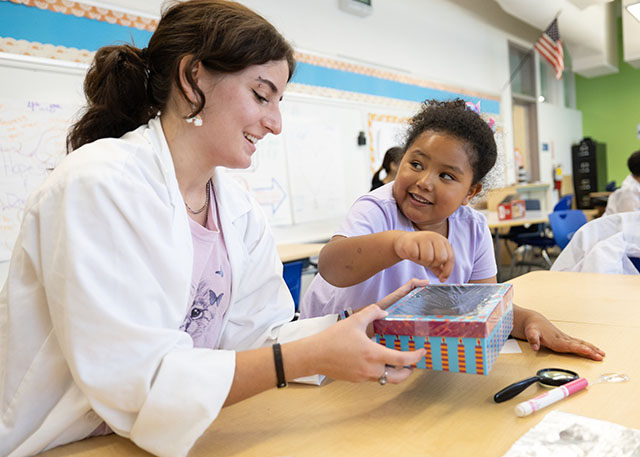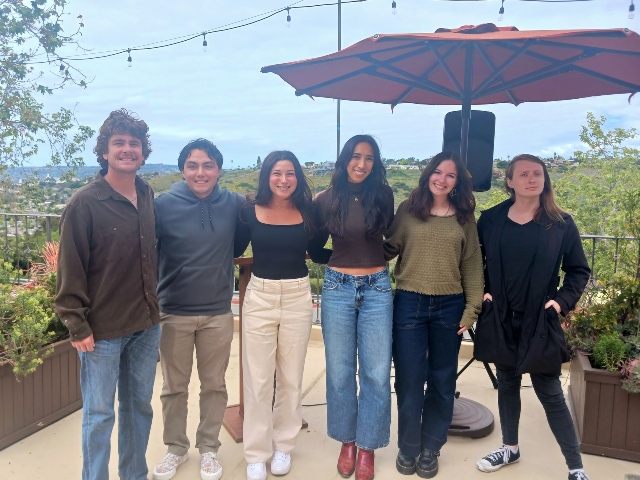Top U.S. EPA Administrator Visits USD

A 90-minute visit Monday to the University of San Diego campus by Gina McCarthy, top administrator of the U.S. Environmental Protection Agency, produced a powerful opportunity for USD faculty and students to connect what they do in the classroom and through research to important issues the federal government organization tackles to produce viable solutions.
Taking on issues such as climate change, environmental justice and clean water is critical to everyone's future. McCarthy, an experienced leader and environmental advocate who has worked at the local, state and national levels, said she respects the science work that is done and that it validates what she does in her role.
"It doesn't get any better than the issues we're working on and the mission of protecting public health and the environment," she said.
Communicating an Interdisciplinary Approach
McCarthy's visit to USD — San Diego 52nd District U.S. Congressman Scott Peters, a key proponent of climate change and environmental legislation, was also present — gave all participants who met in a Shiley Center for Science and Technology classroom a stronger sense of what's happening and what's needed going forward. Key points included a call for better communication of science as the foundation for decision making, a connection to issues affecting our quality of life, and the need to understand the issues through different lenses.
Michel Boudrias, USD department chair and professor in Environmental and Ocean Sciences, is one of the leaders for the Climate Education Partners (CEP) program that has major National Science Foundation-funded support. He stated in a recent editorial that its model has been developed to "combine traditional climate change science analysis with a framework grounded in social and behavioral psychology." He stated in a USD Magazine video how USD’s approach to climate change research is in line with Pope Francis’ recent encyclical, “Laudato Si: On Care for Our Common Home.”
McCarthy is aware of the CEP program and it underscores what she believes is important for students committed to work on innovative solutions.
"One reason I came here was to see how the university engages in things on a multi-disciplinary level. I think training this way is essential for all of us," she said. "You'd be amazed how turned off people get when you can't articulate to them what your work means for them and what we're doing. ... I think it’s essential to have a broad skill set in order to close those loops."
Said Boudrias: "The reality is if you deal with any major issue on the planet right now, you have to come at it from multiple perspectives. For our university, it is well within our mission. Social justice and the environment connect to who we are and what we do. You can come at it from multiple majors, multiple disciplines and within classes and research. You can come at it from an economic perspective, an ethical perspective, as well as from biological and environmental perspectives. That's what is great about having a real-life situation like (McCarthy's visit). This is a person who deals with these very difficult issues and she is presenting it just like that to people."
McCarthy's visit came from a recommendation by Nichole Distefano, a 2001 USD alumna and an environmental science student researcher for Boudrias and Chemistry Professor Jim Bolender on a past research project in Baja California Sur. Distefano is now deputy associate administrator for the EPA's Office of Congressional and Intergovernmental Relations.
USD's Environmental, Sustainable Work
On Monday, 18 USD faculty members representing biology, chemistry, environmental and ocean sciences to mechanical engineering, law, sociology and political science gave brief descriptions of their research projects. McCarthy fervidly took notes as each project was discussed. Additionally, Office of Sustainability Director Michael Catanzaro spoke on USD's sustainability efforts with solar panel, energy and water efficiency projects, a first-of-its-kind college Electronics Recycling Center and the office’s connection to a San Diego Climate Collaborative. She was also briefed on USD's designation as one of only 33 Ashoka U Changemaker Campuses in the world and the Changemaker Hub's collaborative social justice focus on water issues by Faculty Director Mike Williams.
McCarthy’s fondest experience, perhaps, was holding a dragonfly while examining small water tanks on the Shiley Center's rooftop. The tanks were used for a research project done by Biology Adjunct Professor Kate Boersma and senior biology majors Lauren Anderson, Sabrina Parlan and Samantha Leonard that focused on how aquatic organisms respond to drought.
"It is validating for me as a researcher and educator to see one of our top political leaders take an active interest in me and my students' work," Boersma said. "The fact that we witnessed a dragonfly emerging from one of the experimental tanks made it even more special. I feel grateful to have had the opportunity to interact with her and show off some of our students' research."
Answering Students' Questions
McCarthy answered students’ questions ranging from the challenges faced by the EPA, how it can gain more public support for environmental work and diversifying skill sets to be better climate change activists.
"Internships or volunteer work with people who have to take that information and put it into action is critical," McCarthy said. "You get to see how the real world works. One of the biggest lessons people need to learn in college is to keep up your level of enthusiasm. Don't expect that you're going to change the world overnight, but also don't let it dampen your enthusiasm. You have to have reasonable expectations of how the system works and that takes experience."
She praised social media as a communications tool and spoke of the importance of environmental justice and the need to reach all audiences.
"We're working very hard on environmental justice. I think that's a reflection of understanding that people are in very different experiences, even in the U.S.," she said. "We need to approach people in ways that we're not afraid to say there have been communities that have been left behind. We need to embrace diversity and diverse opinions."
— Ryan T. Blystone
Download Attachment (pdf)



